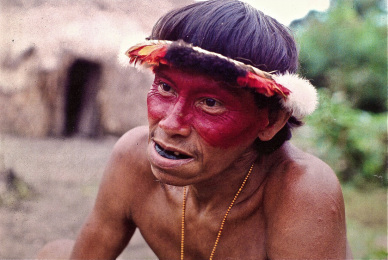|
A DECADE-LONG JOURNEY IN AMAZONIA
From 1987 to 1997 filmmaker Geoffrey O'Connor chronicled stories from the Amazon rainforest ranging from social conflicts and environmental devastation to scandals and crises involving celebrities, do-gooders, and once-prominent indigenous leaders who had fallen on hard times. It was a unique moment in history during which there was an unprecedented amount of contact between Western European populations and the remote indigenous societies of the Brazilian Amazon. One of the first films Geoffrey directed was the Academy Award-nominated film "At The Edge of Conquest: The Journey of Chief Wai-Wai." This documentary short is a stranger in a strange land story chronicling an isolated indigenous leader's first trip to Brazil's capitol to meet with government officials about a proposal to reduce the size of his people's land. Geoffrey's 1997 follow-up documentary "Amazon Journal" received a "Best Feature Documentary" nomination from the International Documentary Association in 1998. It documented the often bizarre and complicated misunderstandings, which occurred between indigenous societies and Western interlopers including journalists, environmentalists, gold miners, rock stars and the filmmaker himself. Central to this critique is the concept of "plastic shamanism" which proliferated in the 1990s and undermined the legitimate causes of indigenous leaders. In the course of his work in the Amazon, Geoffrey was smuggled into Brazil's "national security zone" where he reported on the massive death and environmental degradation wrought by a gold of rush of 40,000 Brazilian wild cat miners onto the lands of 9,000 isolated, Yanomami Indians. His exclusive reports from the region documented chronicled widespread human rights abuses leading to the deaths of 1,500 Yanomami Indians from contact diseases, armed conflicts and acts of genocide. |
Marchadao (above), aka "Big Ax," is a Yanomami shaman and village leader who was a key source in the films "Contact" and "Amazon Journal."
Geoffrey O'Connor chronicled his decade-ling journey in Amazonia in his nonfiction memoire "Amazon Journal: Dispatches from a Vanishing Frontier," which had the prestigious distinction of being a New York Times and Los Angeles Times "Notable Book of the Year" in 1997. His 1995 film "Defying Death in Brazil" chronicles the work of the priest Father Ricardo Rezende who survived seven assassination attempts in a five year period as a result of his work on behalf of the sem terras, or landless peasants of the Brazilian frontier. Rezende, who was also a poet, became the first recipient of Brazil's "Chico Mendes Award" for his work defending Amazonia's landless and was eventually forced to leave the region after one attack that left him hospitalized for several months. This decade of work are dispatches from a tragic moment in history captured through the lens of an American filmmaker working in close partnership with an array of brilliant Brazilian collaborators, generous indigenous sources and interlocutors, and the people of Amazonia who shared their homes and their stories so that these tales could be told. |
